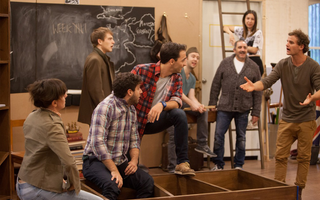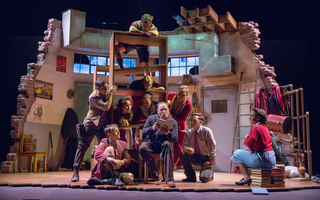War
War is represented in Henry V as a source of both glory and horror. As the play is a story based around warfare, the play is concerned with the realities of violence but also the honour associated with it. Throughout the play, war is connected with ideals of honour. Involvement in war is something that is valorised, especially when it is connected with nation building. At some points in the play, war is glorified and connected to ideas of nation-building and patriotism. At the beginning of Act Two, the Chorus says:
Now all the youth of England are on fire,
And silken dalliance in the wardrobe lies;
Now thrive the armourers, and honour’s thought
Reigns solely in the breast of every man.
Act 2, Prologue
Here, the chorus links war with honour, and suggests that the soldiers are motivated by a desire to defend their country and achieve honour by joining Henry’s army. At the opening of Act Three, the Chorus says:
For who is he, whose chin is but enriched
With one appearing hair, that will not follow
These culled and choice-drawn cavaliers to France? (Act 3, Prologue).
In these lines, the Chorus suggests that the entire nation has been swept up in the glory of the war, and creates an idealistic image of Henry’s soldiers as noble and full of enthusiasm to defend their country.
At other points in the play, however, this depiction of war as honourable and noble is undercut by depictions of its horror. When Henry threatens Harfleur with violence if they do not surrender to him, he uses graphic and violent imagery to illustrate his threats:
If not, why, in a moment look to see
The blind and bloody soldier with foul hand
Defile the locks of your shrill-shrieking daughters,
Your fathers taken by the silver beards,
And their most reverend heads dashed to the walls,
Your naked infants spitted upon pikes,
Whiles the mad mothers with their howls confused
Do break the clouds, as did the wives of Jewry
At Herod’s bloody-hunting slaughtermen.
Act 3, Scene 3
Henry’s detailed description of the awful possibilities that he and his soldiers could unleash on the town undercuts the Chorus’ descriptions of the nobility and honour of Henry’s army. In fact, this section of the play makes the audience question whether there is any glory and honour in war after all. Some, however, have argued that Henry’s threats are merely rhetoric; after Harfleur surrenders, Henry tells Exeter to ensure that the soldiers “use mercy to them all” (Act 3, Scene 3).
Henry’s battle cry of honour is sounded most memorably during his St. Crispin’s Day speech, where he urges his men to think of the glory associated with their involvement in this battle for years to come. To live or to die in this war begets honour:
If we are marked to die, we are enough
To do our country loss; and if to live,
The fewer men, the greater share of honour.
Act 4 Scene 3
For Henry, honour lies in the memory of a deed, something which will bring his men together in shared experience, ‘But we in it shall be remembered, / We few, we happy few, we band of brothers.’ (Act 4, Scene 3).
However, despite Henry’s rousing speech, and the subsequent English victory, the audience is also exposed to the horror of warfare during the battle of Agincourt. Henry’s decision to have the French prisoners of war executed is a scene which is often removed from productions of Henry V as it contrasts so sharply against the idealised vision of English honour. Even before he finds out about the French killing of the English pageboys, Henry orders the executions. In Henry V, war is neither glorious nor is it bereft of meaning. It is the ambivalence of this theme which makes the play such a powerful exploration of warfare.
Leadership
A key theme of Henry V is the question of what makes a good leader. In the opening of scene of the play, the Archbishop of Canterbury describes how Henry has shed the wildness of his youth and now rules England with moderation. However, audiences who have seen Henry IV Part 2 will know that Henry rejected his friend Falstaff at the conclusion of that play, and the memory of this rejection might undermine the honour of his character transformation.
Throughout the play, Henry is depicted as both honourable and ruthless. He is praised for his wisdom by Exeter:
As we his subjects have in wonder found,
Between the promise of his greener days
And these he masters now: now he weighs time
Even to the utmost grain.
Act 2, Scene 4
Exeter believes that Henry is a good king because he considers situations instead of making rash decisions, unlike the French Dauphin. At the beginning of Act 4, the Chorus describes Henry’s bravery in the face of almost-certain death:
Upon his royal face there is no note
How dread an army hath enrounded him;
Nor doth he dedicate one jot of color
Unto the weary and all-watched night,
But freshly looks and overbears attaint
With cheerful semblance and sweet majesty,
That every wretch, pining and pale before,
Beholding him, plucks comfort from his looks.
A largess universal like the sun
His liberal eye doth give to everyone . . .
Act 4, Prologue
In this speech, the Chorus describes Henry as generous, calm, courageous, and able to bring comfort to his soldiers.
However, at other points in the play, Henry is depicted as cold, ruthless, and threatening. At the battle of Harfleur, he threatens the people with the violent murder and rape of their women, children, and elderly citizens if they do not surrender. When he learns that his old friend and drinking buddy Bardolph has been condemned to death for stealing, he approves of the execution and says, “We would have all such offenders so cut off” (Act 3, Scene 6). During the battle of Agincourt, Henry orders that all prisoners of war be killed. These actions have led some to see Henry as a ruthless tyrant, whose hard-heartedness is hidden under a veneer of honour and bravery.
Although Henry’s external qualities are on full show in the play, his internal, psychological state is not clearly revealed. When disguised the night before Agincourt, Henry tells his soldiers, ‘I think the King is but a man, as I am.’ (4.1.99). This line tells the audience that Henry is more affected by the circumstances than he reveals. In this play, the king only has one opportunity to soliloquise. During his soliloquy, he reflects on the emotions he is unable to show, ‘What infinite heartsease / Must kings neglect that private men enjoy?’ (Act 4, Scene 1). Henry V, overall, is an exploration of what it means to be and perform the role of a king.
Performance and imagination
In Shakespeare’s day, theatres had access to minimal scenery and props. Henry V foregrounds this through the role of the Chorus, who asks,
Can this cockpit hold
The vasty fields of France? or may we cram
Within this wooden O the very casques
That did affright the air at Agincourt?
Act 1, Prologue
The Chorus regularly encourages the audience to use their imaginations to make up for the deficiencies of the stage:
[L]et us, ciphers to this great account,
On your imaginary forces work . . .
Think, when we talk of horses, that you see them
Printing their proud hoofs i’th’ receiving earth.
For ’tis your thoughts that now must deck our kings.
Act 1, Prologue
The Chorus strives to engage not only our visual imagination, but the whole sensory experience of the unfolding story. Just like the sound design in a film supports the narrative, so to does Shakespeare's Chorus build the landscape of the scene through the use of alliteration, onomatopoeia, and vivid imagery:
Now entertain conjecture of a time
When creeping murmur and the poring dark
Fills the wide vessel of the universe.
From camp to camp through the foul womb of night
The hum of either army stilly sounds,
That the fixed sentinels almost receive
The secret whispers of each other’s watch.
Act 4, Prologue
Henry V affirms the power of the imagination and suggests that the role of the theatre is not to exactly recreate historical scenes on stage, but rather to ignite the imagination of its audience through powerful storytelling.
Justice
Henry V considers the question of justice, and how humans might decide whether or not an action is just.
At the opening of the play, Henry considers whether his invasion of France would be justified. The Archbishop of Canterbury goes to great lengths to explain why, legally, Henry has a claim to the throne through the female line. This, and the Dauphin’s insulting gift of tennis balls, are enough to convince Henry that he should start a war. However, the war also leads to the loss of many lives. Later in the play, a soldier called Michael Williams points out that Henry bears the responsibility for having potentially led so many men to their deaths:
But if the cause be not good, the king himself hath a heavy reckoning to make, when all those legs and arms and heads, chopped off in a battle, shall join together at the latter day, and cry all, “We died at such a place,” some swearing, some crying for a surgeon, some upon their wives left poor behind them (Act 4, Scene 1).
When Henry finds that his three friends – Scroop, Cambridge, and Grey – have betrayed him and are in league with France, he considers how far justice should be balanced with mercy. Henry, in front of his three unfaithful friends, tells his uncle Exeter to free a man who had drunkenly spoken out against the king the day before. Scroop, Cambridge, and Grey urge Henry to punish the man instead. Scroop says, “Let him be punished, sovereign, lest example / Breed, by his sufferance, more of such a kind.” (Act 2, Scene 2). In response, Henry turns his friends’ logic against them. He reveals their treachery and, when they beg for mercy, tells them: “The mercy that was quick in us but late / By your own counsel is suppressed and killed” (Act 2, Scene 2). In other words, because Scroop, Cambridge, and Grey had urged justice over mercy, Henry will seek justice in response to their crimes, rather than treating them mercifully. After condemning them to death, Henry justifies his decision by saying,
Touching our person seek we no revenge,
But we our kingdom’s safety must so tender,
Whose ruin you have sought, that to her laws
We do deliver you.
Act 2, Scene 2
Henry declares that their execution is not in revenge for their pursuit of his death, but to uphold the laws of his country.
Henry follows this line of reasoning later in the play when he approves of Bardolph’s execution for stealing from a French church, ‘when lenity and cruelty play for a kingdom, the gentler gamester is the soonest winner’ (Act 3, Scene 6). For Henry, what is most important is the maintenance of British laws and morality. However, this scene does provoke questions about Henry’s cruelty as Bardolph was his companion during his errant youth.
Kingship
Due to the fact that much of the play follows the story of a hero-King, it makes sense that a key concern of Henry V looks at what makes a good leader. Shakespeare uses the history of Henry V to explore the relationship between a king with his crown and his subjects. In the opening of scene of the play, Henry is characterised by the Archbishop of Canterbury as having shirked his wild youth and now rules England with moderation. Despite this, the audience is positioned against Henry because of his rejection of Falstaff at the conclusion of Henry IV Part 2. Although the audience may be ambivalent about Henry, the characters of the play are constantly singing his praises. The Chorus, for example, is Henry’s main publicist throughout the play. Henry is perceived as a good king as he embodies the virtues of morality, piety, honour, wisdom and justice. He is praised for his wisdom by Exeter:
As we his subjects have in wonder found,
Between the promise of his greener days
And these he masters now: now he weighs time
Even to the utmost grain.
Act 2, Scene 4
Henry, Exeter tells the French court, is a good king because he considers situations instead of making rash decisions, unlike the French Dauphin. Justice is also important feature of Henry’s kingship, such as when he has the conspirators against him executed:
Touching our person seek we no revenge,
But we our kingdom’s safety must so tender,
Whose ruin you have sought, that to her laws
We do deliver you.
Act 2, Scene 2
Henry declares that their execution is not in revenge for their pursuit of his death, but to uphold the laws of his country. Henry follows this line of reasoning later in the play when he approves of Bardolph’s execution for stealing from a French church, ‘when lenity and cruelty play for a kingdom, the gentler gamester is the soonest winner’ (Act 3, Scene 6). For Henry, what is most important is the maintenance of British laws and morality. However, this scene does provoke questions about Henry’s cruelty as Bardolph was his companion during his errant youth.
Unlike in Shakespeare’s other plays, the king only has one opportunity in the play to soliloquise. This results in Henry V being more about the qualities of kingship rather than the psychological state of the king. When disguised the night before Agincourt, he tells his soldiers, ‘I think the King is but a man, as I am.’ (4.1.99). Despite the dramatic irony, this line tells the audience that Henry is more affected by the circumstances than he reveals. Later, in his soliloquy, he reflects on the emotions he is unable to show, ‘What infinite heartsease / Must kings neglect that private men enjoy?’ (Act 4, Scene 1). Henry V, overall, is an exploration of what it means to be and perform the role of a king.
Honour versus Horror
The two opposing sides of the coin of war are represented in Henry V as glory and horror. As the play is a story based around warfare, it makes sense that the play is concerned with the realities of violence but also the honour associated with it. Throughout the play, war is connected with ideals of honour. Involvement in war is something that is valorised, especially when it is connected with nation building. The Chorus opens Act Two thus:
Now all the youth of England are on fire,
And silken dalliance in the wardrobe lies;
Now thrive the armourers, and honour’s thought
Reigns solely in the breast of every man.
Act 2, Prologue
War, as a way to expand the power of England, is represented as a noble pursuit. This, however, can be read with irony, as the idealisation of war is undercut through descriptions of its horror. The ambivalence of glory and horror in warfare is seen when Henry threatens Harfleur with total violence if they do not surrender to him:
The blind and bloody soldier with foul hand
Defile the locks of your shrill-shrieking daughters;
Your fathers taken by the silver beards,
And their most reverend heads dashed to the walls;
Your naked infants spitted upon pikes…
Act 3, Scene 3
Henry’s long description of the awful possibilities he could unleash upon the town makes the audience realise that this war is not all fun and games. In fact, this section of the play makes the audience question whether there is any glory and honour in war after all. Despite his speech, when Harfleur does surrender, he tells Exeter to make sure that his men ‘Use mercy to them all.’ (3.3.134)
Awareness of the horrors of war is not an exclusive experience of nobility in this play. Henry learns from his troops just how they feel and fear the coming battle of Agincourt when he speaks to them, disguised:
“But if the cause be not good, the king himself hath a heavy reckoning to make, when all those legs and arms and heads, chopped off in a battle, shall join together at the latter day, and cry all, “We died at such a place,” some swearing, some crying for a surgeon, some upon their wives left poor behind them” (Act 4, Scene 1)
Henry’s battle-cry of honour is sounded most memorably during his St. Crispin’s Day speech, where he urges his men to think of the glory associated with their involvement in this battle for years to come. To live or to die in this war begets honour:
If we are marked to die, we are enough
To do our country loss; and if to live,
The fewer men, the greater share of honour.
Act 4, Scene 3
For Henry, honour lies in the memory of a deed, something which will bring his men together in shared experience, ‘But we in it shall be remembered, / We few, we happy few, we band of brothers.’ (Act 4, Scene 3). Despite the glory of this speech, and the subsequent English victory at Agincourt, the audience is again exposed to the horror of warfare. Henry’s decision to have the French prisoners of war executed is a scene which is often removed from productions of Henry V as it contrasts so sharply against the idealised vision of English honour. Even before he finds out about the French killing of the English pageboys, Henry orders the executions, some of which are presented to the audience, ‘[The soldiers kill their prisoners]’. In Henry V, war is neither glorious nor is it bereft of meaning. It is the ambivalence of this theme which makes it such a powerful rendering of warfare.







